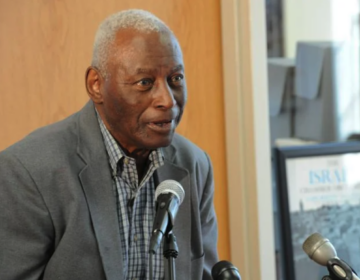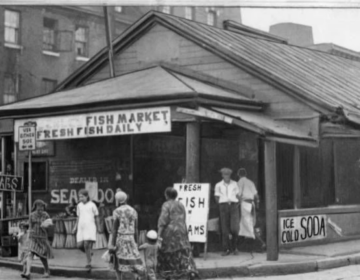Report: Racial disparities prevalent in job opportunities in Philly
Philadelphia faces the challenge of having fewer businesses and employment opportunities than other big East Coast cities.

The Philadelphia skyline is pictured at dusk in May 2020. (Mark Henninger/Imagic Digital)
This article originally appeared on The Philadelphia Tribune.
—
Philadelphia faces the challenge of having fewer businesses and employment opportunities than other big East Coast cities, as it tries to rebound economically from the coronavirus pandemic, a new report found.
The report by the Center City District shows that Philadelphia has the lowest number of businesses per 1,000 residents in 2017 among five major East Coast cities. The city also has the lowest number of Black-owned firms in relation to Black residents.
“We define this as a two-part challenge, which is the barriers of structural racism and the barriers to business growth in the Black community in the context in the city, which has been very slow in business growth overall,” said Paul Levy, CCD president and CEO.
Using data from the 2018 U.S. Census Bureau’s Annual Business Survey, CCD analyzed the total number of businesses in Philadelphia and the number of Black-, Hispanic-, Asian- and white-owned firms and compared the data to four other East Coast cities including Atlanta, Boston, New York and Washington.
Philadelphia had large racial disparities in business ownership, the report found. Among all racial and ethnic groups, the highest rate of business formation was among Asians, with 30 firms per 1,000 Asian residents. Philly had 21.6 white-owned firms per 1,000 white residents, compared to three Hispanic-owned and 1.8 Black-owned businesses per capita.
The report notes that in 2017, Philadelphia had 12.1 businesses per 1,000 residents, less than half the density of Atlanta, where the ratio was 24.6 per 1,000 residents. New York had a business density of 22.4, Boston had 18.6 and Washington had 17.1.
Of the five cities, Philadelphia had the lowest number of Black-owned firms per capita, with 1.8 firms per 1,000 Black residents. Washington, D.C. had the highest number of Black-owned firms per capita, with 5, followed by Atlanta with 4.7, New York with 3.4 and Boston with 2.5.
If Philadelphia had as many Black-owned businesses for every 1,000 Black residents as Washington, the number would nearly triple, rising from 1,174 to 3,329, the report said.
Levy said city leaders need to focus on creating greater business density in the city.
“The pandemic has caused a huge spike in unemployment across the nation,” he said. “To reduce unemployment and poverty as the health crisis ends and recovery begins, Philadelphia will require far more than a return to the status quo before COVID-19.
“We need a sustained effort to increase the number of Black-owned and minority-owned businesses as well as much greater attention to business growth overall. The purpose of this report was just to say job growth, Black business growth and Hispanic business growth are critical issues. We thought that we could really highlight what is really a compelling problem as we look at recovery.”
Della Clark, president of The Enterprise Center, said the report underscores a need to develop an action plan for minority-owned businesses.
“I think that Paul laid out the story and the picture very well but we need now to come up with an action plan that really begins to address the issues around capital and the barriers that minority businesses are faced with accessing that capital,” she said.
Clark said too much emphasis is being placed on offering training programs for minority-owned businesses.
“We cannot grow businesses to scale with just training,” she said. “We need to bring investment capital to the table.”
And leaders can’t just focus on adding more Black-owned businesses, Clark said.
“We need to go deeper with the ones that are there to bring them capital so they can grow to size and scale,” she said. “We need to change the whole ecosystem.”
Clark highlighted the importance of businesses being able to access both capital and contracts.
“They need to be joined at the hip because businesses can’t go after large contracts if they don’t have the capital to fulfill the contracts,” she said.

Get daily updates from WHYY News!
WHYY is your source for fact-based, in-depth journalism and information. As a nonprofit organization, we rely on financial support from readers like you. Please give today.




